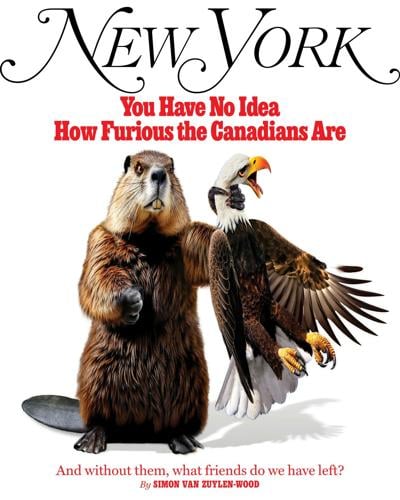A buck toothed national mascot throttling a squawking bald eagle under the headline ŌĆ£You Have No Idea How Furious the Canadians AreŌĆØ had to get people talking. I suspect many who opined about it have not even read the extensive cover story in a recent issue of New York Magazine by Simon Van Zuylen Wood that attempted to let Americans know just how angry Canadians are about President TrumpŌĆÖs trade war.
I promptly posted about it on LinkedIn with the caption: ŌĆ£Captain Kirk is quoted in New York magazineŌĆØ.
I quoted William Shatner telling Van Zuylen Wood ŌĆ£Canada should say to President Trump, ŌĆśYou are the head of a rambunctious country, very difficult to govern at this point. We can ease your pain. Canada is calm, settled, successful. Clean air, clean water, pleasant people. Why donŌĆÖt you become the 11th province?ŌĆÖŌĆØ
I added what I considered the best part of the piece: ŌĆ£It takes a special kind of belligerence to piss off the nicest people on the planet. With friends like us, who needs enemies? And if our enemies now include Canada, we probably donŌĆÖt have any friends left at all.ŌĆØ
I then watched 300 plus comments unspool into a surprisingly revealing tableau of North American psyche.
This was no scientific poll. It was an unscripted, self selected slice of professionals stepping to the mic. Three themes emerged.
The beaver is back, and now has fangs.
The largest bloc of Canadian commenters responded with humour and a rediscovered patriotism. Florida trips have morphed into Prince Edward County wine tours; cross border shopping lists have become ŌĆ£buy localŌĆØ pledges; one poster even suggested invoicing the White House ŌĆ£$150ŌĆ»billion a yearŌĆØ for NORAD airspace. Underneath the jokes lies something serious: after years of quietly leveraging the U.S. market, Canadians are flirting with economic self reliance not due to policy papers but out of pique. TrumpŌĆÖs tariff talk has become the perfect activation trigger. Nothing stirs loyalty like an external threat.
President Donald Trump said in a letter Thursday that he will raise taxes on many imported goods from Canada to 35%, deepening the rift between the longtime North American allies. The letter to Canadian Prime Minister Mark Carney is an aggressive increase to the top 25% tariff rates that Trump first imposed in March. (AP Video / July 11, 2025)
Americans arenŌĆÖt monolithic; they are, however, perplexed.
U.S. voices in the thread split between breezy self deprecation (ŌĆ£If we wanted calm, we wouldnŌĆÖt have invented NASCAR or the filibusterŌĆØ) and wounded counter punches about defence spending or dairy quotas. What they share is surprise at the ferocity of CanadaŌĆÖs response. One consultant who crosses the border monthly confessed that most Americans ŌĆ£donŌĆÖt know or care about CanadaŌĆØ and thus have no idea a trade dispute has morphed into a national psychodrama. The lesson? If the target doesnŌĆÖt know thereŌĆÖs a problem, OttawaŌĆÖs earned media campaign and its billboards havenŌĆÖt caught many AmericansŌĆÖ attention.
The pragmatic middle is quietly anxious.
Buried beneath meme wars and conspiracy riffs was a seam of sober concern. Logistics managers wondered aloud what a tariff spiral would do to integrated auto plants; policy wonks asked how NORAD works if the leaders wonŌĆÖt share a dais; one Alberta commenter lamented that Ontario blocks B.C. wines while Canada demands U.S. free trade. These are the unsexy questions that impact jobs and elections.
Why does any of this matter? LinkedIn has become the C suiteŌĆÖs barometer. Executives scroll between quarterly calls; policy advisors lurk for mood swings; media pros mine it for narrative tension. YouŌĆÖre staring at an unfiltered focus group of the economically engaged. The methodology may be messy, but the stakes are real.
Captain Kirk was only one voice among many in Simon Van Zuylen WoodŌĆÖs article, but his quip was the pull quote and the lightning rod. ThatŌĆÖs the nature of storytelling: a single vivid line can eclipse a hundred policy paragraphs. My LinkedIn experiment proves the inverse is also true. One vivid image, an indignant rodent clutching a defeated raptor, can summon a chorus of real world stakeholders eager to explain what the line missed.
And thereŌĆÖs another lesson: humour travels farther than outrage. The most-liked comment was a mock-Southern drawl praising ŌĆ£maple scented diplomacy.ŌĆØ It beat every profane rebuttal by a country mile. If you want to cut through on a divisive issue, reach for wit before you reach for pitchforks.
Error! Sorry, there was an error processing your request.
There was a problem with the recaptcha. Please try again.
You may unsubscribe at any time. By signing up, you agree to our and . This site is protected by reCAPTCHA and the Google and apply.
Want more of the latest from us? Sign up for more at our newsletter page.































To join the conversation set a first and last name in your user profile.
Sign in or register for free to join the Conversation